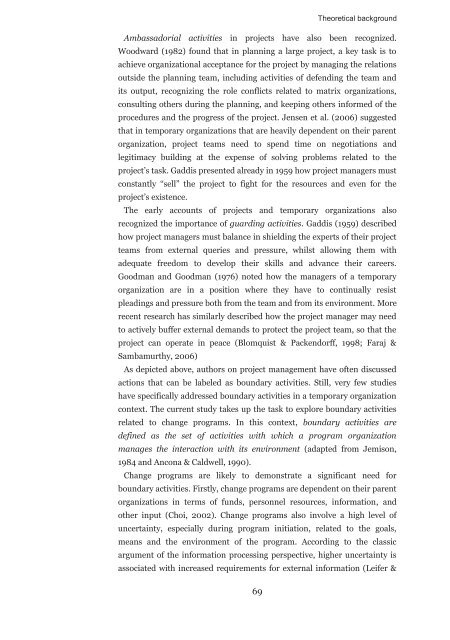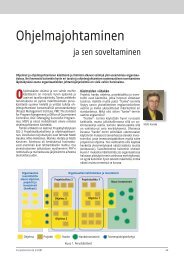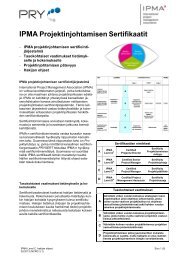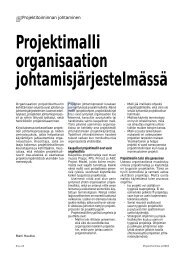Boundary activities and readiness for ... - Projekti-Instituutti
Boundary activities and readiness for ... - Projekti-Instituutti
Boundary activities and readiness for ... - Projekti-Instituutti
Create successful ePaper yourself
Turn your PDF publications into a flip-book with our unique Google optimized e-Paper software.
Theoretical background<br />
Ambassadorial <strong>activities</strong> in projects have also been recognized.<br />
Woodward (1982) found that in planning a large project, a key task is to<br />
achieve organizational acceptance <strong>for</strong> the project by managing the relations<br />
outside the planning team, including <strong>activities</strong> of defending the team <strong>and</strong><br />
its output, recognizing the role conflicts related to matrix organizations,<br />
consulting others during the planning, <strong>and</strong> keeping others in<strong>for</strong>med of the<br />
procedures <strong>and</strong> the progress of the project. Jensen et al. (2006) suggested<br />
that in temporary organizations that are heavily dependent on their parent<br />
organization, project teams need to spend time on negotiations <strong>and</strong><br />
legitimacy building at the expense of solving problems related to the<br />
project’s task. Gaddis presented already in 1959 how project managers must<br />
constantly “sell” the project to fight <strong>for</strong> the resources <strong>and</strong> even <strong>for</strong> the<br />
project’s existence.<br />
The early accounts of projects <strong>and</strong> temporary organizations also<br />
recognized the importance of guarding <strong>activities</strong>. Gaddis (1959) described<br />
how project managers must balance in shielding the experts of their project<br />
teams from external queries <strong>and</strong> pressure, whilst allowing them with<br />
adequate freedom to develop their skills <strong>and</strong> advance their careers.<br />
Goodman <strong>and</strong> Goodman (1976) noted how the managers of a temporary<br />
organization are in a position where they have to continually resist<br />
pleadings <strong>and</strong> pressure both from the team <strong>and</strong> from its environment. More<br />
recent research has similarly described how the project manager may need<br />
to actively buffer external dem<strong>and</strong>s to protect the project team, so that the<br />
project can operate in peace (Blomquist & Packendorff, 1998; Faraj &<br />
Sambamurthy, 2006)<br />
As depicted above, authors on project management have often discussed<br />
actions that can be labeled as boundary <strong>activities</strong>. Still, very few studies<br />
have specifically addressed boundary <strong>activities</strong> in a temporary organization<br />
context. The current study takes up the task to explore boundary <strong>activities</strong><br />
related to change programs. In this context, boundary <strong>activities</strong> are<br />
defined as the set of <strong>activities</strong> with which a program organization<br />
manages the interaction with its environment (adapted from Jemison,<br />
1984 <strong>and</strong> Ancona & Caldwell, 1990).<br />
Change programs are likely to demonstrate a significant need <strong>for</strong><br />
boundary <strong>activities</strong>. Firstly, change programs are dependent on their parent<br />
organizations in terms of funds, personnel resources, in<strong>for</strong>mation, <strong>and</strong><br />
other input (Choi, 2002). Change programs also involve a high level of<br />
uncertainty, especially during program initiation, related to the goals,<br />
means <strong>and</strong> the environment of the program. According to the classic<br />
argument of the in<strong>for</strong>mation processing perspective, higher uncertainty is<br />
associated with increased requirements <strong>for</strong> external in<strong>for</strong>mation (Leifer &<br />
69









